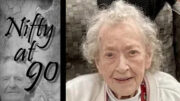From staff reports
One of the darkest periods in French history provides the context for an exhibit at Grove City College.
“The Fruits of Hate: A French City during the Holocaust,” an exhibit researched and curated by David Rosenberg, and “Considering Vichy France: Capitulations, Collaborations, and Confrontations,” which was created by Grove City College students, are on display through April 30 in the Great Room of Breen Student Union.
The exhibit, which is free and open to the public, is hosted and developed by the departments of Modern Languages and History and the college’s Archives and Gallery.
From 1940 to 1944, France was occupied by Germany and ruled by the Vichy regime, which did the Nazi’s bidding, including supporting German dictator Adolf Hitler’s persecution and extermination of Jews.
Rosenberg, a retired archivist and specialist in the history of the Reformation in the city of Amiens, France, set out more than a decade ago to discover what happened to the Jews of that city during Nazi occupation.
His research uncovered hundreds of records. He and his daughter, artist Lydia Rosenberg, curated those records to create the “Fruits of Hate” exhibit, which has been displayed globally, and a website, Jews of the Somme.
The exhibit and website feature the work of Grove City College Modern Languages students, who, under the guidance of Associate Professor of French Kelsey B. Madsen, translated French documents about the roundup of Jews in 1944 in Amiens and letters from Jewish World War I veterans in 1942 seeking exemptions from being forced to wear the yellow star of David under the occupation.
Because “Fruits of Hate” was coming to campus, Baker said she selected Vichy France as the theme students would explore as they learned about writing, researching and discussing historical topics in an academic setting.
Students researched the history of the era individually and with others, selected photographs that typified and exemplified the reality of occupied France, and prepared title cards to accompany them.
The result is “Considering Vichy France: Capitulations, Collaborations, and Confrontations,” an exhibit that narrates key events and debates in Vichy France’s history to contextualize the events of France’s Holocaust during World War II. “It is, in essence, the history of Vichy France in seven photographs,” Baker said.
The exhibit, she said, is meant to provide visitors with a better understanding of the French occupation.
More importantly, the project trained students in presenting history to a wider audience.
“Instead of presenting something to the class or writing a paper that I alone read, this exhibit project allowed them to show off their hard work to their peers and campus visitors while training them to take a large topic and explain it in a concise, professional and educational manner,” Baker said.
The display in Breen’s Great Room was designed and built by Dan Wolfe and students from the Theatre Program, and installed by students from Walczak’s Galleries Studies class. The Great Room is open to visitors from 9 a.m. to 6 p.m. weekdays and 9 a.m. to 3 p.m. Saturdays.





























